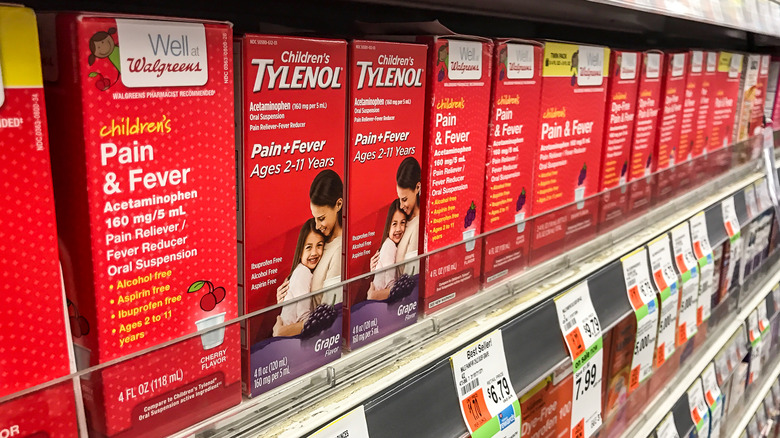What Really Happens When You Take Children's Medicine As An Adult
Have you ever had a headache with no other medicine to be found but children's Motrin? Perhaps there was a time that you experienced especially bad allergies, but could only find children's Benadryl. Sometimes, the over-the-counter medicine is just not available at the exact moment we need it, yet someone nearby (or maybe you) has a diaper bag containing children's medicine.
If you have ever found yourself taking a medicine meant for kids, you are certainly not the first to have done that. It's generally safe for an adult to take OTC children's medicine. However, its effectiveness depends on what you take and how much. The All For Kids Pediatric Clinic shares that dosing for OTC ibuprofen goes by weight, and the dose should be increased according to the weight of the individual.
While it may be safe to take children's Tylenol, you have to watch the dosing. Adults typically weigh more than children, and this is one factor used to determine how much of a dose an adult needs (via Tylenol).
Always check the directions
According to Claritin, it's safe and effective for adults to take their Children's and Juniors allergy products, as long as the package directions are followed. Pepto Bismol is another OTC medicine that can be used at the same dose interchangeably by those aged 12 and up, according to Healthline, and the children's version for under 12 is dosed by weight.
Clinical pharmacy specialist Emily L. Rowe says that some children's and adult medicine are actually the same, and may just differ by its form — liquid, chewable, melt, or pill (via Bay State Parent). It's important to note that, while adults can take children's OTC medications, kids should not take adult OTC medications. The American Academy of Family Physicians states that OTC drugs made for adults can cause harm to a child.
The occasional children's Tylenol may be fine to use in a pinch, but adults should not take a child's prescription medication or give one child's prescription to another. Children's prescriptions, such as antibiotics, are formulated and dosed by the child's weight, and should only be used by the child it was prescribed for (via Henry Ford Health System).


